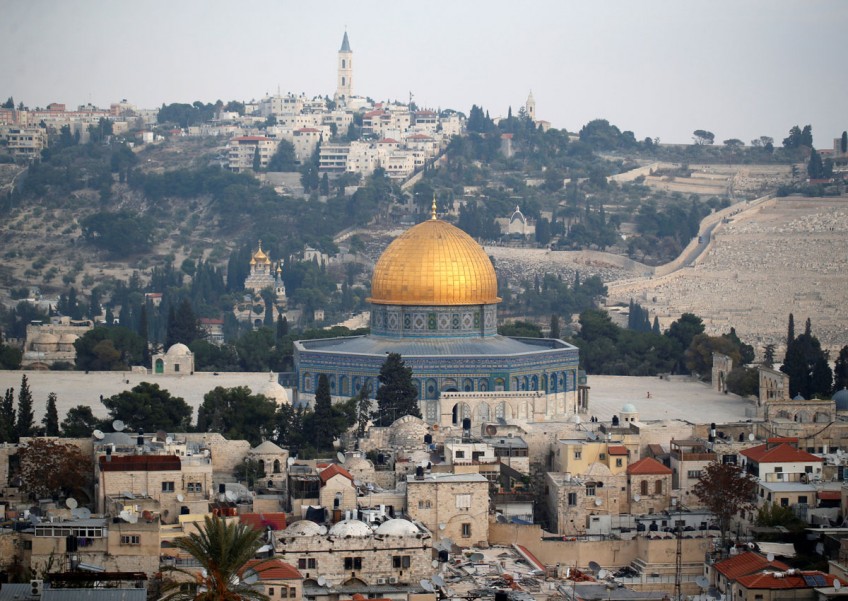Why Trump's decision to declare Jerusalem as Israel's capital is so controversial

JERUSALEM - US President Donald Trump has told Israeli and Arab leaders that he plans to recognise Jerusalem as the capital of Israel, a symbolically fraught move that would upend decades of US policy and upset efforts to broker peace between Israel and the Palestinians.
Mr Trump was expected to announce his decision on Wednesday (Dec 6), two days after the expiration of a deadline for him to decide whether to keep the American Embassy in Tel Aviv.
Underpinning the move is a proposed shift of the US embassy in Israel from Tel Aviv to Jerusalem, despite warnings that it would undermine peace efforts and potentially generate protests across the region.
Here are five questions and answers explaining the sensitive issue:
WHAT IS THE DISPUTE?
Israel seized control of Palestinian east Jerusalem from Jordan during a 1967 war and later annexed it. The move was never recognised by the international community but Israel declared the city its undivided capital.
The Palestinians see east Jerusalem as the capital of their future state.
No countries have accepted Israeli sovereignty and have their embassies in the commercial capital Tel Aviv instead.
Moving the embassy would be seen as the United States endorsing Israel's claim to the city and rejecting the Palestinian one.
WHY IS THE DECLARATION OF JERUSALEM AS ISRAEL'S CAPITAL SUCH A BIG DEAL?
The final status of Jerusalem has been one of the most vexatious questions in the Israel-Palestine conflict. If the US unilaterally declares Jerusalem as Israel's capital, it would be seen as deciding an issue that was supposed to be left to negotiations, breaking with the international consensus.
WHAT IS THE WAIVER?
In 1995, the US Congress passed the Jerusalem Embassy Act calling on the country to move its embassy to the Holy City.
"Since 1950, the city of Jerusalem has been the capital of the state of Israel," it said, demanding the government move the embassy. The act is binding, but there was a clause that presidents could delay it for six months at a time to protect "national security interests".
Presidents Bill Clinton, George W Bush and Barack Obama signed these waivers routinely every six months.
Mr Trump reluctantly signed the first waiver that came due during his presidency on June 1.
The second deadline lapsed on Monday.
WILL TRUMP SIGN THE WAIVER?
During the election campaign, Mr Trump promised multiple times to move the embassy, and his ambassador to Israel, Mr David Friedman, is a strong advocate of the shift.
However, Mr Trump appeared to back away from the idea during his first months in office under pressure from the Palestinians and other Arab leaders.
As he seeks ways to inject new life into moribund peace talks, there were warnings that such a move would infuriate the Arab world.
But Mr Trump is also faced with trying to keep his campaign promise and pleasing his right-wing base, which wants to see the embassy moved.
Mr Dan Shapiro, US ambassador to Israel under Obama, said that such a move in practice would not "have a significant effect, but it will be a signal of future intent to follow through on the president's commitment to actually move the embassy".
"It would be new language for the United States to formally describe Jerusalem as Israel's capital. That has not been the traditional US language."
WHAT HAPPENS IF HE DOESN'T?
If Mr Trump chooses not to sign the waiver, the embassy wouldn't move immediately, but there are rapid repercussions.
Under the 1995 act, the US State Department would see a 50 per cent cut in all its future budgets for "acquisition and maintenance of buildings abroad" until the new embassy opens.
In 2016, US$968 million (S$1,304.09 million) was spent on embassy security, construction and maintenance, according to State Department figures.
WHAT WOULD BE THE IMPACT OF THE MOVE?
Mr Alan Baker, a former Israeli ambassador to Canada, said recognition of Jerusalem as Israel's capital without moving the embassy would amount to a "sort of legal acrobatics - trying to please both sides and not annoy either".
But Mr Baker said "anything is better than now, where Jerusalem is not recognised by Israel's best friend and supporter".
Moving the embassy would be seen as cementing Israel's hold over the city .
Palestinians see the issue starkly differently.
Mr Saeb Erekat, secretary general of the Palestine Liberation Organisation, said on Sunday that such recognition would "promote international anarchy and disrespect for global institutions and law".
The United States would "be disqualifying itself to play any role in any initiative towards achieving a just and lasting peace", he said.
The Palestinian Islamist movement Hamas, which controls the Gaza Strip, called on Saturday for a new "intifada" if Washington recognises Jerusalem as the capital of Israel or moves its embassy to the disputed city.
WHO LIVES IN JERUSALEM?
The city has a population of around 850,000 people, over a third of whom are Arab and the remainder Jewish.
Although there are some mixed neighbourhoods in Jerusalem, most of the neighbourhoods are split.
HAVE ANY COUNTRIES EVER HAD THEIR EMBASSIES IN JERUSALEM?
Before 1980, several countries did, including the Netherlands and Costa Rica.
However, when Israel passed a law in July of that year declaring Jerusalem as its united capital, the UN Security Council responded with a resolution condemning Israel's annexation of East Jerusalem and declared it a violation of international law.
In 2006, Costa Rica and El Salvador became the last countries to move their embassies out of Jerusalem, joining the rest of the world in locating their embassies in Tel Aviv.